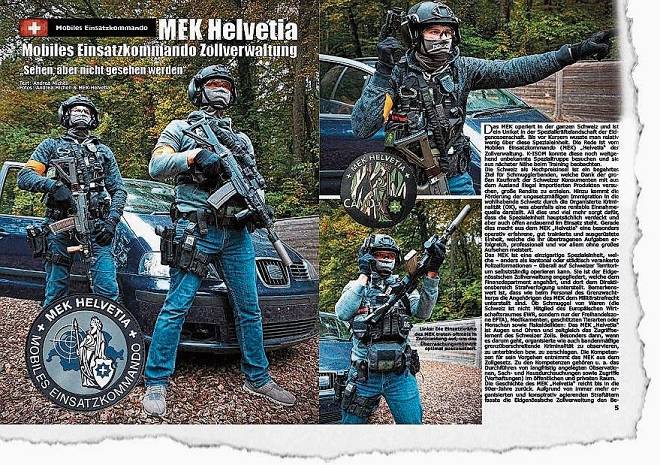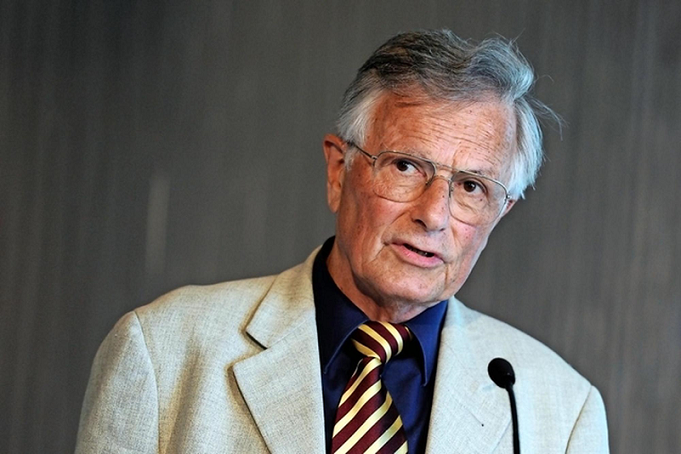

"General Bock's Rambos" were prominently featured in the February 2021 issue of K-ISOM, a German magazine [PDF] which covers “the real world of modern elite and special units”.
In the last part we introduced the controversial Christian Bock and looked at some of the critical media coverage which he has attracted in Switzerland recently. More specifically, we saw how Bock has become the subject of increasing public scrutiny due to his aggressive and confrontational management style as director of the Federal Customs Administration (FCA).
"Like the preceding coverage in the print media, the SRF report referred to Bock's fondness for dressing up in a specially designed ceremonial uniform and carrying a gun."Amongst other things, it was mentioned that the Swiss TV channel SRF produced a report on the situation at the FCA, entitled "Zolldirektor mit Pistole: Der umstrittene Christian Bock" ("Customs Director with a Pistol: the controversial Christian Bock").
Like the preceding coverage in the print media, the SRF report referred to Bock's fondness for dressing up in a specially designed ceremonial uniform and carrying a gun.
According to SRF, Bock's fondness for wearing his dress uniform - despite the fact that his job is essentially a civilian administrative position - has earned him the derogatory nickname "General Bock".
"The MEK Helvetia was originally set up in 2006, but prior to Bock's arrival it always operated in a low-key manner and stayed out of the public spotlight."Bock has also attracted a lot of criticism because of his over-enthusiastic promotion of the Swiss Customs' paramilitary mobile response unit, known as the Mobiles Einsatzkommando Helvetia (MEK Helvetia).
The MEK Helvetia was originally set up in 2006, but prior to Bock's arrival it always operated in a low-key manner and stayed out of the public spotlight.
However, Bock has ambitious plans to reshape the Federal Customs Administration.
More specifically, he wants to transform it from its traditional role as a predominantly civilian fiscal tax-collecting authority into a paramilitary border security agency endowed with extensive powers of surveillance and intervention.
"...he wants to transform it from its traditional role as a predominantly civilian fiscal tax-collecting authority into a paramilitary border security agency endowed with extensive powers of surveillance and intervention."And so it came to pass that - with Bock's approval - the MEK Helvetia ended up posing in a very public manner in a 20-page spread published in the February 2021 edition of Kommando – International Special Operations Magazine (K-ISOM). K-ISOM is a magazine published in Germany which is dedicated to “the real world of modern elite and special forces".
The reaction in Switzerland was predominantly negative.
A former cantonal police commander did not object to the existence of such a force but he took the view that it was "stupid and harmful to spread it over 20 pages in a magazine."
An expert in the Swiss Ministry of Defence was quoted as saying "These are General Bock's Rambos". The expert - who preferred to remain anonymous - noted that not even Putin's special forces would put themselves on public display in such an ostentatious manner.
"It was even questioned whether there was an adequate legal basis for such a special militarised unit under the control of the FCA."Some representatives of the Swiss cantons argued that the Federal Customs Administration did not need “expensive Rambos to kick down doors" because there were already enough well-trained special units in cantonal security forces and in other federal government agencies. It was even questioned whether there was an adequate legal basis for such a special militarised unit under the control of the FCA.
These doubts arose because Switzerland is a decentralized federation with a highly devolved system of government in which the cantons are sovereign to the extent that their sovereignty is not limited by federal law. The competence of the federal government is restricted to a limited number of areas. Public security and law enforcement are primarily matters for the cantons.
This constitutional arrangement is a fundamental aspect of Swiss-style democracy which has deep historical roots. Bock's plans to restructure the FCA as powerful federal police force in the style of the FBI run contrary to Switzerland's long-established constitutional traditions and have attracted vigorous criticism from many quarters.
"This constitutional arrangement is a fundamental aspect of Swiss-style democracy which has deep historical roots."One of his most prominent critics is Markus Mohler, a former public prosecutor and retired Commissioner of Police in Basel. Although now retired from public service, Mohler remains active as a legal consultant.
"From a legal perspective, measures of this kind which involve curtailments of fundamental rights should be defined in a specific and concrete manner in order to ensure their compatibility with the rule of law."According to Mohler, the legislative proposal drafted by Bock is not compatible with the Swiss constitution because - amongst other things - it envisages the takeover of cantonal security competencies by the Federal Customs Administration.
Mohler described Bock's legislative proposal as "poorly drafted". In particular, he criticised numerous general clauses which are designed to grant the customs authorities access to policing and surveillance powers which have not been clearly defined.
From a legal perspective, measures of this kind which involve curtailments of fundamental rights should be defined in a specific and concrete manner in order to ensure their compatibility with the rule of law.
"By a curious coincidence, Markus Mohler also holds a part-time position at the EPO where he is the Chairman of the Disciplinary Committee of the EPO's Administrative Council."Mohler expressed surprise that, despite the manifold deficiencies in Bock's legislative draft, it still managed to pass muster at the Federal Ministry of Justice, which is supposed to function as the "legal conscience of the Federal Council".
By a curious coincidence, Markus Mohler also holds a part-time position at the EPO where he is the Chairman of the Disciplinary Committee of the EPO's Administrative Council.
This is the body which is competent to conduct disciplinary procedures against Council appointees such as the EPO President, Vice-President and members of the Boards of Appeal. Mohler was appointed to this position at the 154th meeting of the Council in December 2017. (warning: epo.org link)
"It is not known whether Mohler has ever expressed any opinion about the serious breaches of the fundamental rights of EPO staff which occurred during the Battistelli era with the complicity of the Swiss delegation. It would certainly be interesting to hear his views on that topic."The Administrative Council's Disciplinary Committee has only been called into action on one occasion over the last 40 years, namely in the notorious case concerning a member of the Boards of Appeal who was unlawfully subjected to a "house ban" by Benoît Battistelli in December 2014. As far as can be determined, Mohler was not involved in that case.
It is not known whether Mohler has ever expressed any opinion about the serious breaches of the fundamental rights of EPO staff which occurred during the Battistelli era with the complicity of the Swiss delegation. It would certainly be interesting to hear his views on that topic.

Swiss legal expert Markus Mohler is sharply critical of "General Bock" and his attempted power grab at the Federal Customs Administration. Mohler also holds a part-time position at the EPO where he is the chairman of the Disciplinary Committee of the Administrative Council.
[PDF]
"It was also reported that his "Twitter" account had been deleted."Amongst other things, Maurer denounced the critical media reports about Bock [PDF] - in particular the series of articles authored by Henry Habegger and published by the CH media group in April 2021 - as a "one-sided and defamatory campaign."
However, some weeks later in June 2021, it was reported that Maurer had failed to secure the backing of his peers in the national government - the Federal Council - for his efforts to defend his controversial Customs Director.

Bock (left) was supported by Federal Finance Minister Ueli Maurer (right), but in June 2021 it was reported that Maurer had failed to obtain the backing of the Federal Council for his controversial Customs Director.
"Although the SFAO was fundamentally positive about the plans for the digitisation of the Customs Administration, it identified a number of serious problems in the ongoing implementation."More recently in September 2021, Swiss media reported that Bock had re-surfaced but that he was now conducting himself in a more subdued manner. [PDF]
At around the same time, it also became known that the Swiss Federal Audit Office (SFAO) had published the results of an intermediate assessment of the implementation of Bock's DaziT programme. [PDF]
Although the SFAO was fundamentally positive about the plans for the digitisation of the Customs Administration, it identified a number of serious problems in the ongoing implementation.
"In its latest assessment, the SFAO confirmed that it lacked "a complete and comprehensible view of the total costs."
It remains to be seen how Bock will deal with the fallout from the latest SFAO report and whether or not he will manage to survive much longer in his current position as Director of the Federal Customs Administration."Back in 2018, the SFAO had recommended that mechanisms be created "to objectively assess results or goal achievement." However, in its most recent report it noted that these control mechanisms are still under construction. This made it difficult to perform "a robust assessment of progress" and had a negative impact on the "reliability of the results assessment".
According to media reports (see above PDF), insiders have long warned about the danger of DaziT getting out of control financially. One criticism which has been voiced repeatedly is that no one really has an overview, either of the status of expenditures or of everything that is being developed and financed.
In its latest assessment, the SFAO confirmed that it lacked "a complete and comprehensible view of the total costs."
It remains to be seen how Bock will deal with the fallout from the latest SFAO report and whether or not he will manage to survive much longer in his current position as Director of the Federal Customs Administration.
"So far nobody in Switzerland appears to have noticed that - during his time as deputy head of the Swiss delegation on the EPO's Administrative Council from June 2000 until the end of 2014 -Bock served his apprenticeship under the malignant influence of Grossenbacher, Battistelli and their cronies."Many commentators have expressed surprise that an individual like Bock has been able to rise to such a senior management position inside the Swiss civil service. In particular, they have wondered where he acquired his authoritarian and confrontational management style which is rather untypical for Switzerland.
So far nobody in Switzerland appears to have noticed that - during his time as deputy head of the Swiss delegation on the EPO's Administrative Council from June 2000 until the end of 2014 -Bock served his apprenticeship under the malignant influence of Grossenbacher, Battistelli and their cronies.
Perhaps it is nothing more than a coincidence, but in his current role as Director of the Swiss Federal Customs Administration, Bock now seems to be replicating a style of toxic management uncannily similar to that promoted by Battistelli at the EPO between 2010 and 2018.
"Perhaps it is nothing more than a coincidence, but in his current role as Director of the Swiss Federal Customs Administration, Bock now seems to be replicating a style of toxic management uncannily similar to that promoted by Battistelli at the EPO between 2010 and 2018."That concludes our look at the delegates representing the Swiss Confederation in June 2013 - namely, the Administrative Council "alpha male" Roland Grossenbacher and his deputy, the future "General Bock" - both of whom seem to have been whole-hearted and enthusiastic supporters of Battistelli's liberticidal project at the EPO.
In the next part we will turn our attention to the members of the French delegation who likewise endorsed the Vichyite "Strike Regulations" proposed by their compatriot Benoît Battistelli. ⬆